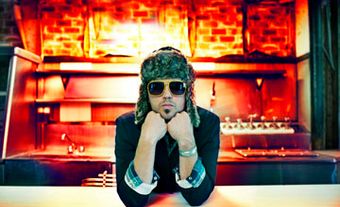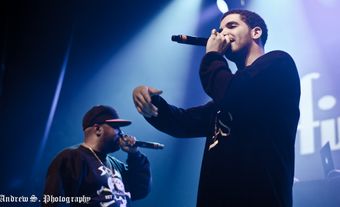David Clayton-Thomas (born David Henry Thomsett), singer, songwriter, producer (born 13 September 1941 in Surrey, England). An aggressive yet sensitive singer with a robust, soulful voice, Juno and Grammy Award winner David Clayton Thomas was a pioneer on the Canadian music scene in the 1960s and maintained a long solo career, but is perhaps best-known as the lead singer of the American jazz-rock group Blood, Sweat & Tears. He has been inducted into the Canadian Music Hall of Fame, the Canadian Association of Broadcasters Hall of Fame and Canada’s Walk of Fame. His work has been recognized by the Grammy Hall of Fame and the Canadian Songwriters Hall of Fame.
Early Years
The son of a Canadian soldier and an English music student, Clayton-Thomas was born in England and moved with his family to the Toronto suburb of Willowdale when he was four. He received some musical education from his mother, but a troubled relationship with his abusive father led him to run away at age 15. He spent his teen years living on the street and in various reformatories — including the Guelph Reformatory and the Burwash Correctional Centre near Sudbury — doing time as a serial offender for vagrancy, petty theft and street fighting.
Singing in his cell earned him fans among his fellow inmates and, after teaching himself to play an abandoned guitar, he was soon performing jailhouse concerts. He was released in 1962 and began performing as Sonny Thomas (later David Clayton-Thomas) on Toronto’s Yonge Street strip, where he developed a reputation as a tough, brawling blues singer. John Lee Hooker became his idol and Ronnie Hawkins his mentor. The music of jazz greats Lenny Breau, Oscar Peterson and Moe Koffman was equally influential.
Early Bands
Clayton-Thomas’s first band, David Clayton-Thomas and The Fabulous Shays (later The Shays), was an R&B outfit that had hits in 1964 with “Out of the Sunshine” and “Walk That Walk,” a rendition of Hooker’s “Boom Boom.” They opened for the Rolling Stones at Maple Leaf Gardens and played the NBC-TV variety program “Hullabaloo” (1965) at the invitation of host Paul Anka.
After The Shays broke up, Thomas played solo in Toronto’s Yorkville coffeehouses and sat in with his hero, Hooker, at the Riverboat. He then joined the Bossmen, which featured the prodigious jazz pianist Tony Collacott. The Bossmen was one of the first rock bands to incorporate jazz elements, and had a Top 20 Canadian hit in the summer of 1966 with the fiercely political, anti-Vietnam War song “Brainwashed.”
After the Bossmen broke up, he formed the David Clayton-Thomas Combine with former Bossmen guitarist Jack Mowbray. They released two singles through Arc Records, one of which had the original version of Clayton-Thomas’s “Spinning Wheel” as a B-side. He was then invited to New York by Hooker, and spent two years playing clubs in Greenwich Village before being deported for having a criminal record and working illegally in the US.
Blood, Sweat & Tears
In 1968, Blood, Sweat & Tears drummer Bobby Colomby, who had met Clayton-Thomas in New York through folk singer Judy Collins, asked Clayton-Thomas to be the band’s new lead singer. The group’s first album with Thomas, Blood, Sweat & Tears (1968), earned wide critical acclaim and sold one million copies in the US within three months of its release. The singles “You’ve Made Me So Very Happy,” “And When I Die” and “Spinning Wheel” all hit No. 2 on the Billboard Hot 100 chart. The band headlined Woodstock; and the album, which won three Grammy Awards including Album of the Year (beating out the Beatles’ Abbey Road), spent 109 weeks on the Billboard top album chart (including 13 weeks at No. 1) and sold more than 10 million copies worldwide.
In 1970, Blood, Sweat & Tears became the first rock band to break through the Iron Curtain and perform in Eastern Europe, which they did at the request of the US State Department in exchange for a permanent residency visa for Clayton-Thomas. They also toured throughout North America, played regular stints in Las Vegas and contributed music to the soundtrack of the Barbara Streisand movie The Owl and the Pussycat (1970). These activities, however, hurt the band’s image within the counterculture that had initially supported it.
The cover-song heavy Blood, Sweat & Tears 3 was released in late 1970. Though not as well received as its predecessor, it topped the Billboard album chart and was certified gold in the US on the strength of the Top 40 US singles “Hi-De-Ho” and Clayton-Thomas’s “Lucretia MacEvil.” Blood, Sweat & Tears 4 (1971) also went gold and broke the Top 10 of the Billboard album chart, but marked the beginning of the band’s commercial decline.
1970s Solo Work
Frustrated with the band’s infighting and grueling touring schedule, Clayton-Thomas left Blood, Sweat and Tears in early 1972 to work as a solo artist. He released the tepidly received albums David Clayton-Thomas (1972), Tequila Sunrise (1973) and Harmony Junction (1974), and worked regularly in Las Vegas. In 1973, he received a special Juno Award for Outstanding Contribution to the Canadian Music Scene.
Return to Blood, Sweat & Tears
He returned to Blood, Sweat & Tears in 1974 and assumed leadership in 1976, shepherding the band through many changes in membership. Following the dissolution of the band after the death of saxophonist Gregory Herbert in 1979, Clayton-Thomas assembled an entirely new lineup consisting of Canadian musicians, including bassist David Piltch, keyboardist Joe Sealy and trumpeter Bruce Cassidy, and released the more funk-oriented Nuclear Blues (1980). He secured legal rights to the name Blood, Sweat & Tears in 1984, and toured with an ever-evolving roster of players until 2004.
Solo Work: 1990s–2000s
In addition to his 1970s solo albums, Clayton-Thomas has released Blue Plate Special (1997), The Christmas Album (2001), Aurora (2005), In Concert: A Musical Biography (2005) — recorded live at the Opera House in Toronto, The Evergreens (2007), Spectrum (2009), Soul Ballads (2010) and A Blues for the New World (2013).
In recent years, Clayton-Thomas has become an advocate for prisoner’s rights. In 2010 he survived a serious heart attack, played Massey Hall with the Toronto Symphony Orchestra and contributed a track to the World Jazz for Haiti charity album in support of the Red Cross earthquake relief fund, which also featured Jane Bunnett, John McDermott, Holly Cole and the Shuffle Demons. That year also saw the publication of his autobiography, Blood, Sweat and Tears.
Awards
Album of the Year (Blood, Sweat and Tears), Grammy Awards (1970)
Outstanding Contribution to the Canadian Music Scene, Juno Awards (1973)
Inductee, Canadian Music Hall of Fame (1996)
Hall of Fame Award (Blood, Sweat & Tears), Grammy Awards (2002)
Inductee, Canadian Songwriters Hall of Fame (2007)
Inductee, Canadian Association of Broadcasters Hall of Fame (2008)
Inductee, Canada’s Walk of Fame (2010)

 Share on Facebook
Share on Facebook Share on X
Share on X Share by Email
Share by Email Share on Google Classroom
Share on Google Classroom


